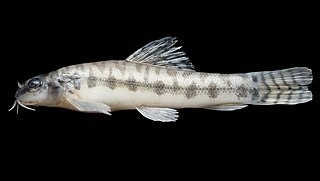
Rendahl's messmate is a pearlfish of the family Carapidae, found in the southwest Pacific Ocean around Australia and New Zealand at depths to 60 metres (200 ft). Its length is between 10 and 12 centimetres .The larvae has a long filament on its head which bears some resemblance to a siphonophore. These fish live within sponges. The specific name honours the Swedish naturalist and artist Hialmar Rendahl who collected the specimens in the Tasman Sea which were used by Gilbert Percy Whitley to describe this species.

Pseudolabrus is a genus of wrasses native to the eastern Indian Ocean and the Pacific Ocean.
Sinibrama of freshwater ray-finned fish belonging to the family Xenocyprididae, the East Asian minnows or sharpbellies. The fihses in this genus are found in southern China, Taiwan, Laos, and Vietnam. These are silvery fishes with deep, laterally compressed bodies, large eyes, and terminal mouths. They tend to grow no larger than 20 cm in standard length.

Misgurnus is a genus of true loaches found in Europe and Asia. The origin of the name Misgurnus comes from the Greek word miseo and the Turkish gür (loud), a name given to them due to their habit of becoming very active during barometric pressure changes that occur during thunderstorms. The common names, weather loach or weatherfish, also derive from this behavior. Some species of misgurnus are eaten, mostly in Asia, and are also sold as pets in the aquarium trade. Their average size can range from 6 to over 12 inches.

Craterocephalus is a genus of small and slender brackish or freshwater silversides from Australia and New Guinea. It is the most diverse genus in the family Atherinidae, containing 25 of the 71 species.

Microctenopoma is a genus of fish in the Anabantidae family. They are native to Africa. Microctenopoma has been included in Ctenopoma in the past; unlike that genus, they are bubblenest builders, and the males defend the eggs and fry until they are free swimming.

Mylopharyngodon is a genus of freshwater ray-finned fishes belonging to the family Xenocyprididae, the East Asian minnows or sharpbellies. There is one extant and one extinct species in this genus.
Sinibrama longianalis is a species of ray-finned fish in the genus Sinibrama. This species is endemic to Guizhou in China.
Sinibrama macrops is a species of ray-finned fish in the genus Sinibrama. It is found in southern and southeastern China and in Taiwan. It lives in rivers in slow, deep water.
Discocheilus is a genus of freshwater ray-finned fish belonging to the family Cyprinidae, the carps, barbs, minnows and related fishes. The species which belong to this genus are endemic to China.
Hemiculterella is a genus of freshwater ray-finned fishes belonging to the family Xenocyprididae, the East Asian minnows or sharpbellies. The fishes in this genus occur in eastern Asia. There are currently three species in this genus.

Batrachomoeus is a genus of toadfishes.

Daector is a genus of toadfishes, with three species found along the Pacific Coast of Central America and two species, D. gerringi and D. quadrizonatus, are found in South American rivers.
Echiodon is a genus of pearlfishes, with these currently recognized species:
Onuxodon is an Indo-Pacific genus of pearlfishes from the family Carapidae. The generic name is derived from the Greek onyx meaning "claw" and odon meaning "tooth", referring to the sharp fang like teeth of Onuxodon parvibrachium. Species in this genus are distributed from South Africa to Hawaii. They live commensally with molluscs. The three currently recognized species are:

The Nemacheilidae, or stone loaches, are a family of cypriniform fishes that inhabit stream environments, mostly in Eurasia, with one genus, Afronemacheilus found in Africa. The family includes about 790 species.

Xiangshuiosteus wui is an extinct monospecific genus of brachythoracid arthrodire placoderm from the Late Emsian stage of the Early Devonian epoch, discovered in Wuding County of Yunnan province, China. It has recently been reassessed as a dunkleosteid.

Paracanthocobitis is a genus of freshwater ray-finned fishes belonging to the family Nemacheilidae, the stone loaches. This genus is known from the Indus basin in Pakistan to the Mekong basin of Cambodia and Laos The type species is Paracanthocobitis zonalternans. Some authorities treat this as a subgenus of Acanthocobitis
Discocheilus wui is a species of freshwater ray-finned fish belonging to the family Cyprinidae, the carps, barbs, minnows and related fishes. This species is found in the Hongshuihe River in Guangxi, southeastern China.
Carl Hialmar Rendahl was a Swedish zoologist, cartoonist and painter. He is most famous in Sweden for his authorship of Fågelboken, the "bird book" which sold 60,000 copies.










